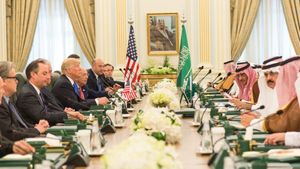Germany stands on the brink of significant political transformation as Friedrich Merz, the leader of the Christian Democratic Union (CDU), is expected to take the chancellorship. Merz’s recent election victory has sparked discussions about the future direction of Germany, particularly concerning its role within Europe and the transatlantic alliance.
"The world will not wait for us. We must now rapidly regain our ability to act," Merz stated just before his victory. His ambitious timeline suggests he aims to form a new federal government by Easter, emphasizing the need for Germany to be fully present on both the European and global stages. This urgent call to action reflects the high expectations placed upon Germany by its neighbors and allies.
Since Donald Trump’s return to the White House, the need for Germany to assert itself has become even more pressing. Observers note Trump's administration has adopted a somewhat dismissive attitude toward European affairs, complicaying Germany's international positioning. For example, Merz pointed out on election night, "the Americans — at least this part of the Americans, this administration — are largely indifferent to Europe's fate." This situation prompts Germany to explore building its own initiatives and potentially lessen its dependence on the U.S. for defense.
Political analysts highlight the delicate balance Merz must strike between maintaining strong transatlantic relations and fostering greater European independence. He remarked, "If it is destroyed, [U.S.-Germany relations] would not only be detrimental to Europe, it would also be detrimental to America." Therefore, threading the needle on foreign relations is key to his administration's goals.
A coalition government is Merz's first challenge. The CDU/CSU received only 28.6% of the vote and will need to partner with the Social Democratic Party (SPD), which has seen its support dip to just over 16%. The CDU's criticisms of the SPD during the campaign, especially on European partnership initiatives, will need to be reconciled for any effective governing alliance to emerge.
Merz has made it clear: "Germany must once again assume a leading role in Europe — not from the top down, but with France, with Poland, with a strong European Union." Achieving consensus on key issues such as Ukraine will be pivotal for the coalition's success. Both parties agree on avoiding negotiations about the war without Ukrainian and European participation, and they recognize the importance of continuing arms supplies to Ukraine.
During the campaign, Merz supported measures like delivering German Taurus cruise missiles to Ukraine — something former Chancellor Olaf Scholz had rejected. This move indicates Merz’s proactive stance on military support, especially as Germany’s commitment to the Ukraine cause remains high, with approximately €28 billion ($29 billion) provided since Russia's invasion.
But Germany faces considerable challenges at home, particularly concerning its defense budget. Experts estimate the military will require around €80 billion ($83.7 billion) by 2028 to meet NATO obligations. Yet with the national budget already strained, where to find this funding remains contentious. The SPD advocates for new debt, whereas Merz is focusing on economic growth and cutting social benefits to finance increased military expenditure.
Aside from military issues, Merz has expressed intentions to invite Israeli Prime Minister Benjamin Netanyahu to Germany, regardless of the controversy surrounding Netanyahu related to war crimes charges. This reflects Merz's intent to maintain strong relations with key allies but also raises legal and ethical questions about Germany's obligations under international law.
Merz's new leadership could mark a shift toward assertive European policies, especially as he faces the uncomfortable reality of NATO potentially undergoing fundamental changes due to shifting American attention. Recognizing these geopolitical changes, he stated, "I would never have thought I would have to say something like this... it is clear this government does not care much about the fate of Europe." He emphasized the need for Europe to establish its defense capabilities independent of the U.S.
The need for coherent European defense mechanisms is more urgent than ever, especially as Europe grapples with security concerns stemming from the war in Ukraine and Russia's increasing assertiveness. Merz said, "We will have to establish an independent European defense capability much more quickly." This perspective resonates with many European leaders who have called for more strategic autonomy from U.S. military reliance.
Despite the challenges, various European publications have reacted positively to Merz's commitment to tackling these pressing issues collaboratively within the EU framework. His clear stance promoting European unity has garnered attention, with remarks indicating he has learned necessary lessons from the current geopolitical climate.
Looking forward, it remains to be seen how Merz will balance internal coalition dynamics with the necessity of establishing Germany as a prominent player on the European stage. Major decisions lie immediately ahead, as coalition negotiations commence, determining Germany's path through turbulent international waters.
With the stakes high, and Europe’s future potentially hanging in the balance, Merz’s approach will be closely watched by both allies and critics alike. He carries the weight of Germany's expectations, where the interplay of national and international responsibilities will shape the course of German politics and European stability.



